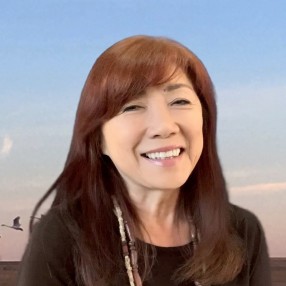
大澤 眞知子
オオサワ マチコグループ
[Japan is so weird. Or is it me?- A Language Takes 11 Years?!] Chapter2-9
-
![]()
カナダ大学留学に備え真剣に準備する日本の中・高校生のためのSupport Group-カナダクラブ
その貴重なパートナーであり、UX English (カナダからの英語学習サイト) AdministratorであるRobert McMillanが語るストーリー”Japan is so weird. Or is it me?”
クリティカルシンキングの国カナダから日本にやって来た若者が出会った変てこ日本ストーリー
クリティカルシンキング不在の不思議の国日本から、カナダに向かう日本人のために
カナダで出会う180度真逆カルチャーショックへのワクチンとして贈ります
(日本語訳付き)
Chapter 1 Chapter 2-9 はこのリンクから
A Language Takes 11 Years?!
Late one night at a sleepy gas station in Shikoku, I accidentally froze the attendant. He diligently ran to my car and asked – more like shouted – if I was paying by cash (Genkin desu ka?), and I replied that I was fine, thank you (Genki desu, arigato!). He stood bewildered, mouth open, fuel hose in hand, watching me with bowling-ball eyes.
It was very obvious that I had misunderstood him. So I waited for another question. Patience was crucial, I learned, when making a mistake in Japanese. Shut up and patiently wait for someone to educate me. But no question came. We watched each other for a few awkward seconds before he turned, stuck the fuel hose into my van, and began to fill it up.
I paid him in cash and drove away as he shouted thanks and bowed so low that I wondered if he had mistaken me for someone important. Someone more important than a tired young Canadian desperately trying to teach English to Japanese children and frantically trying to learn their language.
Filling up notebooks with hiragana and katakana; reading children’s books; speaking to locals with what I learned; making mistakes by the bucketful and barely clawing my way out. That would be an appropriate definition for my study of Japanese.
Confident by then that I had learned hiragana and would struggle with katakana forever, I turned to kanji. I spent hours of my life memorizing kanji characters, forgetting them, and memorizing them again. Still, kanji has my respect. It’s exasperating but beautiful. Kanji characters, interspersed with cursive hiragana and clunky katakana, look like graceful dancers. They seem to move even when still.
It soon became clear that kanji would be a lifetime project. A foreign language is like that – a lot of work. The expert way to learn Japanese, says the author and comedian Dave Barry, is so easy: “be born as a Japanese baby and raised by a Japanese family, in Japan” (from Dave Barry Does Japan). For the rest of us, learning Japanese is hard.
Learning any foreign language is a struggle when you haven’t been brought up around one. Most of us are not gifted with this skill. I am certainly not. My strength is with logic. I studied mathematics at university because I was a logical thinker. I leveraged that ability to study Japanese. To me, Japanese grammar was a math formula. I just plugged variables (words) into the formula. The word sappari, for example, was an adverb that could be conveniently dropped in front of verbs.
That realization helped me understand my students better. What do you do with a student who cannot pronounce English? Or a student too shy to open her mouth in a conversation class? Try to find their strengths. What are they good at? What are they confident in? Find that and work with it. Praise them; make them proud of their strength; and watch it grow with them.
For students who can’t pronounce but have people skills, for instance, teach them to speak while watching their opponent’s reaction. Then, at signs of confusion – such as bowling-ball eyes – explain your ass off, using different words. That shy girl who could not speak but loved books? Leverage her writing skills and praise them. Good readers tend to be good writers. When a student is confident in her written work, she may vocalize it. I’ve had students, dead quiet until high school, suddenly start speaking full, thoughtful English sentences.
I gave myself six months to a year. I would be fluent in Japanese by then, I told myself before coming to Japan. But I did not know much about foreign language study. I was immersed in a single-language culture while growing up, just as Japanese students are. It took me years to become proficient enough in Japanese to express my opinions and personality. Years of not understanding people. Years of wanting to speak but not being able to. Years of not getting close to people and feeling alone.
I met a Ukrainian lady in Vancouver who suggested a better timeline for language learning. She came to Canada with little English ability, and it took her 11 years to feel confident speaking English. To feel confident that she could express herself, argue against injustices, and take on any situation with words. I reflected on my own experience and agreed. It took me roughly 11 years to feel confident speaking Japanese.
Today, education agents will tell Japanese students not to worry about their English before studying abroad. Study English there, they argue. It’s easy, they say. You’ll pick it up in no time, they add.
Don’t listen to them. If you want to have meaningful conversation with your peers. If you want to avoid being taken advantage of. If you want to enjoy a life outside of your own loneliness. Don’t make the mistake I did. Prepare yourself. Study before you go. Your experience will be far richer.
Life in Japan for me was far more enjoyable after 11 years.
Japan is so weird. Or is it me?
(to be continued) 
I still help students prepare writing skills for schools in North America. I love helping serious students, so give me a shout if you are interested.
______________________________
外国語を話せるようになるまでには11年かかる?
見るだけで眠気を誘うような四国のガソリンスタンドの夜遅く、わざとではないんだけど、店員を凍りつかせてしまった。店員は、一生懸命僕の車まで走り寄って来てこう聞いた – 聞いたというより叫んだ – 僕が現金で支払うかどうかを(Genkin desu ka?)。僕は「元気ですよ、ありがとう。(Genki desu, arigato!)」と答えた。店員はめちゃくちゃ混乱していた。口を開けたまま。ガソリンホースを手に持ったまま、目の玉が落ちそうになるくらい僕を見つめていた。
僕が誤解し間違えたのは一目瞭然。仕方ないから、何も言わず次の質問を待った。日本語で間違えた時には、忍耐は極めて重要だと知っていたから。黙って、我慢強くそこにいる日本人が教えてくれるのを待つこと。でも、質問は来なかった。気まずい数秒間、店員と僕はお互いを見つめ合い、やがて店員はガソリンホースを僕の車に突っ込み仕事を始めた。
現金で支払い、ガススタを後にした。店員はお礼の言葉を叫び、おでこが地面につくほど深くお辞儀した。僕を誰か重要人物だと誤解したのだろうか。日本の子供に必死で英語を教えようとし、躍起になって日本語を学ぼうとしている疲れたカナダ人の若僧よりも重要な誰かと。
ひらがなとカタカナでノートを埋め尽くし;子供向けの本を読み;習ったことを近くにいる日本人に試し;わんさか失敗し、バレる前にこっそりその場を離れる。これが、僕の日本語学習を最も適切に表す定義かな。
よし、ひらがなはわかったぞ、そしてカタカナはこれからずっと苦労し学び続けるぞという自信を味方に、漢字に向かった。人生を削るような何時間も何時間もを費やし、漢字を暗記し、忘れ、また暗記した。それでも、漢字は称賛に値する文字だと思う。イライラするけど美しい。流れるような行書体のひらがなと不格好なカタカナの間に散りばめられた漢字は、優雅な踊り子のように見える。そこに存在しているだけで動いているようにも見える。
漢字の学習は一生ものだと、すぐ否応無しに納得した。外国語習得はみな同じ、膨大な努力が必要。余談だけど、こんなプロ級の方法もあるよと、作家でありコメディアンでもあるDave Barryが言っていた。「日本語習得には、日本で生まれ、日本の家族に育てられるのが最良の方法」 (from Dave Barry Does Japan) そんな幸運が訪れなかったほとんどの外国人には、日本語は難しい。
成長する過程で、近くにその言葉を話す人がいない場合は、外国語の習得には苦労がつきまとう。大多数の人は言語習得スキルには恵まれていない。そして、絶対僕にはそのスキルはない。僕の強さはロジック。論理的思考が得意だから、大学では数学を専攻した。そのロジック能力を日本語習得のために活用した。僕にとっては、日本語文法は数学の公式。変数(単語)を公式に当てはめていった。例えば、sappariは副詞で、都合よく動詞の前にポンと落とせる。
この方式を理解すると、生徒の事が前よりよくわかるようになった。英語を発音出来ない生徒をどうする?または、会話のクラスでも、恥ずかしがりで口を開けない生徒にはどう対応する?その生徒たちの強さを探してみよう。何が得意だろう?どんなことに自信を持っているんだろう?それを探して、そこから教えること。褒めること。自分の強いところが自慢出来るようにリードすること。そして、そこから生徒が成長するよう見守ること。
発音は出来ないけど人とうまくやっていける生徒には、例えば、相手の反応を見ながらしゃべるよう教える。それから、相手の目の玉が落ちそうになるほど混乱した兆候に気づいたら、必死で説明する。違う単語を使って。声は出せないけど読書の好きな恥ずかしがりの女生徒には、書く能力をうまく使って褒めよう。本の好きな子は、書くことも得意なはずだから。自分の書いたものに自信を持つと、それを声に出せるかも。高校までは死んだような沈黙を守り続けた生徒たちも結構いた。その生徒たちが高校生になると、突然、完璧でよく考え抜かれた英語で話し始めた。
カナダを出る前には、日本語習得のための時間制限をつけていた。6ヶ月から1年で十分なはず。それまでには流暢な日本語を話せるようになるはず。日本に来る前にはそう信じ込んでいた。外国語学習についてなど全く何も知らない無知な時間制限。カナダで育つ間は、単一言語の中にどっぷり浸かっていた僕の無知。そして気がついた。今日本で教えている生徒も同じなんだ。日本語という単一言語の中に埋没しているわけだ。僕が日本語で自分の意見を言えたり、自分を表現出来るようになるには相当年数もかかった。その間は周りの人たちを理解することも難しかった。話したくてウズウズしたけど、話せない年月が過ぎていった。人に近づきたいけど話せず、ひとりぼっちだった年月が過ぎていった。
バンクーバーで、ウクライナ人女性と出会ったことがある。外国語習得へのもっと的確なタイムラインを教えてくれた。彼女は英語がほとんど出来ないままカナダにやって来て、話すことに自信が持てるまでに11年かかったそうだ。自分自身を表現出来る自信がつき、不公平なことにも反論し、どんな状況にも言葉で対応出来るようになるまでに11年間。僕も、自分自身の経験と照らし合わせると全く同感。日本語を話すことに自信が持てるまでに、大体11年かかった。
今、留学エージェントはこう宣伝する。「留学前には英語なんて出来なくていいですよ。」「英語は留学してから勉強したらいい。」「簡単ですよ。」と、勧誘する。「すぐに話せるようになりますよ。」と、たたみかける。
留学し、現地で意味のある会話をしたいと思ったら、留学エージェントの誤魔化しには耳を傾けないように。留学先で英語力不足のためにつけこまれたくなかったら。ひとりぼっちで閉じこもることもなく、留学先の人たちとの生活を楽しみたかったら、エージェントの嘘に騙されないこと。僕がしたのと同じ間違いをしてほしくない。外国に行く前に外国語は十分学び、準備してから行くこと。比べようもない程豊かな経験が出来るから。
11年後の日本での生活は、はるかに充実したものとなった。
日本はそんなに変テコ? それとも僕?
(続く)
私は現在もカナダ・アメリカの学校で学ぶのに必要なwriting skills を教え、日本の生徒が留学前に十分な準備が出来るよう指導しています。真剣に学ぶ意欲のある生徒を指導することには喜びを感じています。11年かかる前に十分準備したいですか? 連絡して下さい。
「カナダ大学正式留学」eBook
Pandemic禍の留学Support Group Canada Club
「カナダ高校留学実態総集編」eBook
「カナダ高校留学アセスメント」テスト
「小学生のための英語アセスメント」テスト
カナダ発日本人のための本格的英語学習サイト UX English
わかりやすいクリティカルシンキング講座
Podcast [カナダにいらっしゃい!]
 「留学」のコラム
「留学」のコラム
高校留学:パンデミック後もとに戻った本来のカナダ高校レベルに悲鳴(2024/04/17 08:04)
カナダ大学留学:履修コースの選び方(2024/04/16 08:04)
カナダ留学の本当の話(2024/04/11 07:04)
カナダ大学留学をBoost(2024/04/10 07:04)
カナダ大学留学:英語スコアはOKだが高校の成績・履修内容が低い場合の対策(2024/04/07 04:04)






